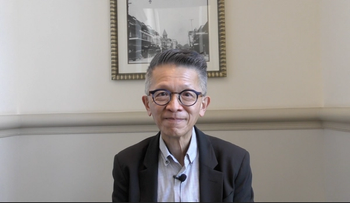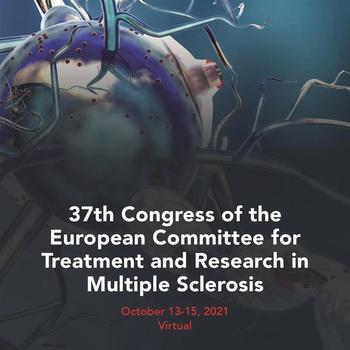
Amit Bar-Or, MD, FRCPC, FAAN, FANA, commented on his presentations at CMSC 2021, one of which focused on COVID-19 vaccination, which experts do not believe poses risks for those on disease-modifying therapies.

Amit Bar-Or, MD, FRCPC, FAAN, FANA, commented on his presentations at CMSC 2021, one of which focused on COVID-19 vaccination, which experts do not believe poses risks for those on disease-modifying therapies.

The staff member at the Mellen Center for Multiple Sclerosis discussed reasons why patients may stop treatment, as well as strategies for maintaining communication with the healthcare team in the event of discontinuation. [WATCH TIME: 5 minutes]

Brian Hutchinson, PT, MSCS, commented on the Multiple Sclerosis Achievement Center program, which includes patient data spanning a 3-year period.

The associate professor of pediatrics and neurology at Rutgers–Robert Wood Johnson Medical School commented on the need to recognize when adolescent patients are ready to learn more about their condition. [WATCH TIME: 5 minutes]

Vikram Bhise, MD, outlined useful questions to include in conversation when discussing the transition to adulthood for patients with pediatric multiple sclerosis.

Vikram Bhise, MD, discussed findings recently presented at CMSC 2021, where teenagers with multiple sclerosis were interviewed to identify perceptions of QOL during the transition to adulthood.

The founder of Food Matters 365, in Greensboro, North Carolina, commented on the benefits of adding a dietitian to the healthcare team for patients with multiple sclerosis. [WATCH TIME: 3 minutes]

The associate professor of pediatrics and neurology at Rutgers–Robert Wood Johnson Medical School discussed findings from a qualitative study that aimed at understanding priorities and concerns within this patient population during a transitional period.

The registered dietitian at Food Matters 365 in Greensboro, North Carolina, discussed the role nutrition can play in treating comorbidities, sharing her thoughts on popular elimination diets. [WATCH TIME: 2 minutes]

Anna Kratz, PhD, associate professor of Physical Medicine & Rehabilitation, and a research nonclinical psychologist, University of Michigan Medicine, offered insight into the multidisciplinary approach to managing fatigue for patients with multiple sclerosis.

Data presented at CMSC 2021 suggest worse COVID-19 outcomes were associated with patients with neuromyelitis optica spectrum disorder and other comorbidities.

In total, 72% of responders reported spasticity as a top 5 most problematic symptom, with 17% ranking it as the single most difficult symptom of MS to manage.

The director of the Multiple Sclerosis/MRI Research Group at the University of British Columbia spoke to some of the newer biomarkers and measures being assessed in the clinical management of multiple sclerosis. [WATCH TIME: 3 minutes]

The director of the Multiple Sclerosis Experimental Therapeutics Program at Johns Hopkins Medicine offered insight on the TREAT-MS trial to attendees of the CMSC 2021 annual meeting.

Data further investigated the impact of how individual disease-modifying therapies affect outcomes for this patient population.

The post-doctoral scholar at the University of Iowa outlined his presentation at CMSC 2021 which focused on the use of elimination diets to improve symptoms of MS. [WATCH TIME: 2 minutes]

All told, 48% of patients with MS reported that their most common primary person for guidance on cannabis use in MS was themself or no one, followed by a dispensary professional and MS physician.

The director of the Multiple Sclerosis/MRI Research Group at the University of British Columbia spoke to the portable Standardized MRI Protocol card that is being distributed in an effort to better inform the community to follow the newly published guidelines. [WATCH TIME: 2 minutes]

In the presidential lecture series at CMSC 2021, Ellen M. Mowry, MD, called into question whether or not the induction treatment approach in multiple sclerosis does in fact present a higher chance of preventing long-term disability.

Investigators provided 4 strategies for health care providers to implement when speaking to patients with MS, in an effort to improve communication between both parties.

Real-world data from a single-center study with more than 4 years of follow-up showed similar rates of moderate infections and malignancies to the general population with multiple sclerosis.

The results demonstrate a positive change in patients with previous disease-modifying drug failures.

Patient data were evaluated over a 3-year period, with analyses from baseline, year 1, and year 2 presented at previous CMSC meetings.

Both diets resulted in patients with MS reporting significant changes on Perceived Deficits Questionnaire scores for fatigue and cognitive dysfunction after 12 weeks of intervention.

The NeurologyLive staff compiled highlights from our discussions with experts in one convenient location, following ECTRIMS 2021.

Discussing a 6-week, virtual program conducted over Zoom, the founder of First Coast Integrative Medicine, spoke on the use of telehealth and future research efforts for integrative medicine in MS. [WATCH TIME: 3 minutes]

"Mind Moments," a podcast from NeurologyLive, brings you an exclusive interview with Stephen Krieger, MD.

Chaired by Devon Conway, MD, the presentations also feature Cleveland Clinic experts Kedar Mahajan, MD, PhD; Marisa McGinley, DO; and Amy Kunchok, MD. [WATCH TIME: 1 hour, 33 minutes]

Deborah Miller, PhD, commented on strategies to maintain patient-provider communication following the discontinuation of disease-modifying therapies in MS.

The founder of First Coast Integrative Medicine spoke on a 6-week virtual program that introduced IM modalities, including guided journaling, nutrition, and yoga. [WATCH TIME: 3 minutes]